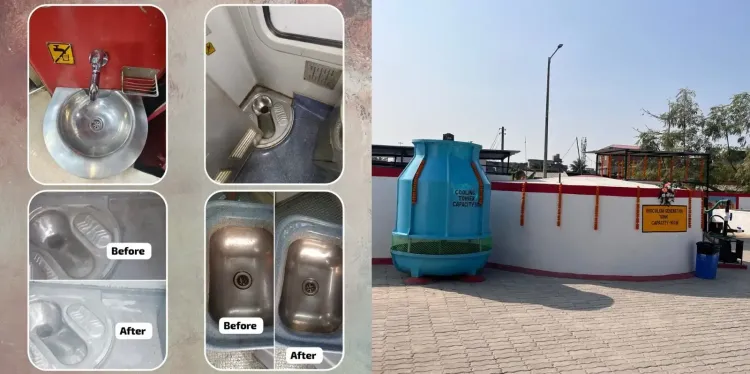Northeast Frontier Railway Implements Bio-Toilets for Sustainable Waste Management

Synopsis
Key Takeaways
- NFR is implementing Bio-toilets for waste management.
- New facilities improve sanitation standards.
- Commitment to hygiene and passenger safety.
- Production capacity of 2,000 litres per day.
- Supports Swachh Bharat mission.
Guwahati, April 24 (NationPress) The Northeast Frontier Railway (NFR), which operates across the northeastern states and in seven districts of West Bengal and five districts of North Bihar, is actively implementing Bio-toilets to promote eco-friendly waste management.
NFR Chief Public Relations Officer (CPRO) Kapinjal Kishore Sharma announced on Thursday that the NFR has embraced a holistic strategy to guarantee a clean, hygienic, and comfortable travel experience for all passengers.
Significant initiatives include Onboard Housekeeping Services (OBHS) for ongoing cleaning during journeys, mechanized cleaning systems at stations and depots, and the extensive deployment of Bio-toilets to foster eco-friendly waste management.
Sharma revealed that in a groundbreaking initiative to enhance the efficiency and hygiene of Bio-toilets, NFR has launched a state-of-the-art Bacteria Inoculums Generation Plant and Testing Laboratory at the Kamakhya (KYQ) coaching depot.
This positions NFR as the first zone in Indian Railways to integrate both the production and quality assurance of Bio-toilet inoculums under one roof, guaranteeing a consistent supply and improved performance of onboard sanitation systems.
These initiatives underline NFR’s unwavering commitment to uphold high hygiene standards and enhance passenger safety throughout its network. Bio-toilets are crucial to NFR's mission of promoting eco-friendly and hygienic sanitation systems on trains, stated the CPRO.
According to the official, the core of this system is the Anaerobic Microbial Inoculums (AMI), a specialized bacterial solution that aids in the decomposition of human waste, contributing to cleaner and more sustainable onboard sanitation.
The new facility boasts a production capacity of 2,000 litres per day. With in-house production capabilities, NFR now produces inoculums at significantly reduced costs while ensuring DRDO-certified quality, he added.
“To further ensure reliability, a dedicated in-house testing lab at KYQ conducts weekly monitoring and quality control of the AMI utilized in coaches.”
This initiative has already demonstrated remarkable results, with 35,000 litres of inoculums supplied to all NFR depots in March 2025, greatly enhancing the maintenance and functionality of Bio-toilets, Sharma stated.
He emphasized that this development signifies a major advancement in improving cleanliness across stations and trains, providing passengers with a more enjoyable, hygienic, and comfortable travel experience.
With proactive cleaning measures, including mechanized systems at stations and innovative in-house sanitation solutions onboard, NFR is establishing new benchmarks in railway hygiene. These efforts reflect a passenger-centric approach to service excellence. Through this progressive initiative, NFR reinforces its commitment to a cleaner, safer, and more welcoming railway environment, in line with the vision of ‘Swachh Trains and Swachh Bharat’, the NFR CPRO concluded.






